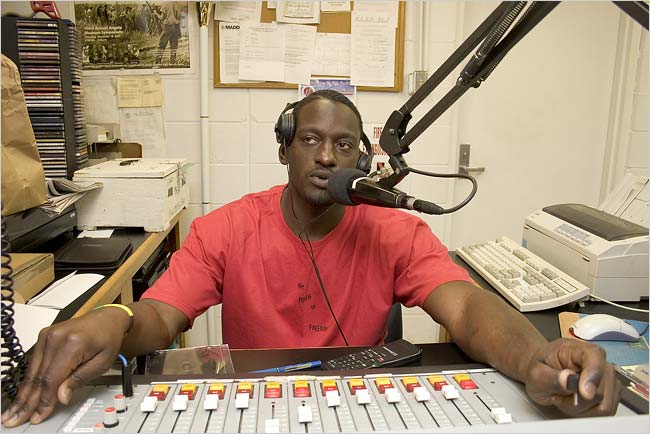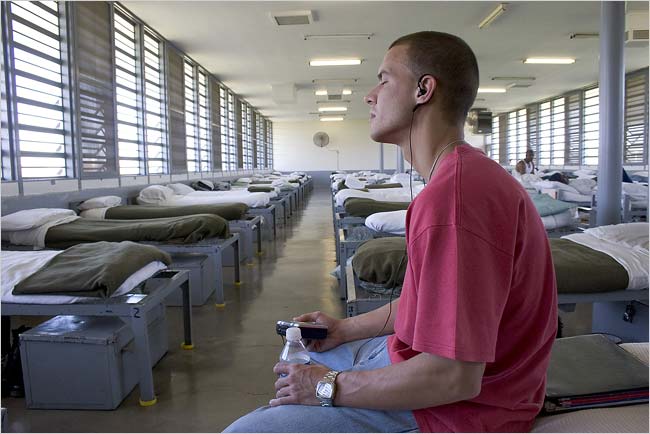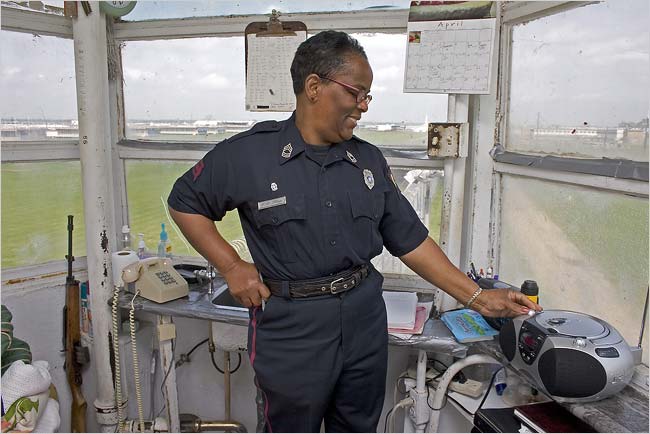| Want to send this page or a link to a friend? Click on mail at the top of this window. |
| Posted April 12, 2006 |
 |
Andy Levin/Contact Press Images, for The New York Times |
| Sivoris Sutton is a D.J. known on air as Shaq at KLSP-FM, the Louisiana State Penitentiary station where gospel wins out gangsta rap. |
| Spinning Hope on Incarceration Station |
By PAUL VON ZIELBAUER |
ANGOLA, La., April 6 — KLSP, a radio station with one turntable, six employees and a $48 weekly payroll, has limited reach over this patch of swampy farmland and razor wire northwest of Baton Rouge. It is meant to be that way.
The station director and most of the D.J.'s are convicted murderers. Most of its 5,100 listeners are serving life sentences at the Louisiana State Penitentiary here. The 100-foot metal pole that transmits the station's F.C.C.-approved signal — a relatively weak but consistent 100 watts — rises from a grassy knoll behind death row.
Death row, home to 83 men, is where KLSP-FM (91.7), which prison officials say is the nation's only licensed prison radio station, finds its most dedicated audience and inspiration for its core mission: spreading the word of Jesus (and an occasional message from the warden) to men doomed to die behind bars.
"Our greatest challenge is to give hope where there is hopelessness," said Burl Cain, the warden at Angola, where the average sentence is 89.9 years with almost no chance of parole.
"This radio station helps do that — it beams out positive information, positive gospel music," he said. "Even gospel rap."
 |
Andy Levin/Contact Press Images, for The New York Times |
| Justin Granier, in for murder, is a listener. |
The station is in a two-room cinderblock shed next to Angola's main prison compound. KLSP, "the incarceration station, the station that kicks behind the bricks," as Sirvoris Sutton, a D.J. and program manager, puts it, broadcasts from 6 a.m. to 2 a.m. daily.
A Harris AirWave mixing board, two CD players, an aging Gem Sound turntable and a digital playlist pump out a steady variety of gospel — praise and worship, uptempo, quartet and choir — during work hours. After 6 p.m., the prison's six D.J.'s, who earn 20 cents an hour, spin an eclectic mix of bluegrass, hip-hop and golden oldies. Friday nights, after a talk show for 170 Muslim inmates, KLSP reveals its regional bias, playing hours of swamp pop, a Cajun brand of rock 'n' roll.
Still, prison officials screen all music for sexual, violent or negative lyrics; gangsta rap and heavy metal are not played. The station has no telephone, so song requests arrive by prison mail. D.J.'s, all of them inmate trustees allowed to move without guards, can be fired for breaking the smallest rule, including using KLSP stationery, as one former D.J. did, to write letters to a girlfriend.
KLSP also dives into old-fashioned radio journalism. A five-minute satellite news feed from the Moody Bible Institute's broadcasting arm in Chicago arrives at 55 minutes past each hour. Celebrity visitors, mainly well-known Christians, including the former heavyweight boxing champion George Foreman and the televangelist Kenneth Copeland, sit for live interviews. A 12-inch color television in the studio carries news from outside.
"It's one of the better jobs you can have here," said Mr. Sutton, 35. (His on-air name, DJ Shaq, was given to him by inmates who saw him dunk a basketball.) The station's purpose is "to begin to understand the men here," he said. A prison radio station has to connect differently with its listeners: "It's a different language."
Angola, known as the Farm, is at the end of a 19-mile rural highway, spreading over 18,000 fertile acres on which inmates farm corn, soybeans, wheat and raise cattle. Serene as the prison appears now, its legacy is soaked in the blood of its inmates. In 1951, 31 prisoners slashed their Achilles tendons to protest Angola's violence and living conditions.
The prison has been home to a few well-known artists, including the bluesman Leadbelly in the 1930's and Wilbert Rideau, a former death row inmate who used Angola's court-ordered reforms in the 1970's to establish an award-winning prison magazine, The Angolite.
KLSP is the spawn of that artistic legacy, and, Warden Cain said, is central to what he calls the prison's "Bapticostal" underpinnings, which foster a mutual respect between his administration and the inmates.
The prison's Christian-based message has been so successful at keeping the peace that other states have referred to it as a model, though not without legal challenges. In August, the American Civil Liberties Union filed a lawsuit accusing Warden Cain and the Louisiana state prison system of hindering a Mormon inmate's access to religious texts.
Does the prison in essence sanction one religion above others? Cathy Fontenot, an assistant warden, said the station's mainly Christian message promotes safety and, besides, is what the inmates want to hear.
Said Warden Cain, "There really is so many positives from the radio station and really no negatives."
The radio station started in 1987, when the evangelist Jimmy Swaggart gave inmates old equipment from his radio network.
In 2001, executives from a South Carolina Christian radio station came to Angola with Charles W. Colson, the Watergate felon who founded Prison Fellowship Ministries. Broadcasting remotely from the prison, they raised $120,000 to buy modern radio equipment that allowed KLSP to upgrade its programming and expand its daily airtime to 20 hours. All the music it plays is donated.
Still, 100 watts does not push the station's signal far beyond the prison gate, where an etched monument gives tribute to Philippians 3:15: "Let us therefore, as many as be perfect, be thus minded: and if in any thing ye be otherwise minded, God shall reveal even this unto you."
 |
Andy Levin/Contact Press Images, for The New York Times |
| St. Gloria King listens in the guard tower. |
Seven miles down Highway 61, KLSP's signal begins to fade. Ten miles out, there is only white noise.
At a prison like Angola, where most inmates will die of old age, days are measured not by a clock but, in the words of Kerry Myers, The Angolite's current editor, a "time that slows down, down and down until it seems to stop."
The radio station exists partly to keep that time from stopping for too long. That, inmates say, is when bad things happen.
"When you hear a song from your childhood, it kind of frees you from the atmosphere that you're in," said Rockin' Robin Polk, a KLSP D.J. and technician who has spent more than half of his 46 years at Angola for a crime he said he preferred not to have printed.
Mr. Sutton, a k a DJ Shaq, said the station maintained a steady, calming influence in inmates' lives. "It's a familiar voice, a voice they trust," he said. "Every morning, you get up and think, 'Hey, there's a purpose.' "
Many inmates said that KLSP provided a sense of community, even pride, because it was a positive daily influence created by guys they knew. And, they said, the station is commercial-free.
Willie Humphrey, serving the 31st year of a life sentence for armed robbery, said he was not religious but regularly listened to KLSP for the bouncy gospel music. But sometimes, said Mr. Humphrey, 53, a D.J. breaks the spell. "Some guys will try and use big words," he said, smiling, "and it don't really come out right."
Phil Shappard, a technical manager for Moody Broadcasting Network, said KLSP's influence on its listeners belies its limited resources.
Mr. Shappard, who plans to make his fourth visit to Angola in August to deliver training tools like pronunciation guides and vocabulary software, said: "The radio station is all about moral rehabilitation. The root of it is ministry, personal ministry to the men there."
After 19 years of prison radio, KLSP's success has led to even bigger ideas at Angola. Later this year, Warden Cain said, the prison plans to begin building a small television studio, with equipment donated from a station in Lafayette, La.
"I wouldn't do it," Warden Cain said, "without the radio station first."
Copyright 2006 The New York Times Company. Reprinted from The New York Times, Arts, of Wednesday, April 12, 2006.
| Wehaitians.com, the scholarly journal of democracy and human rights |
| More from wehaitians.com |